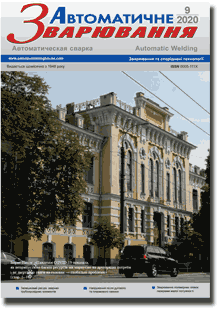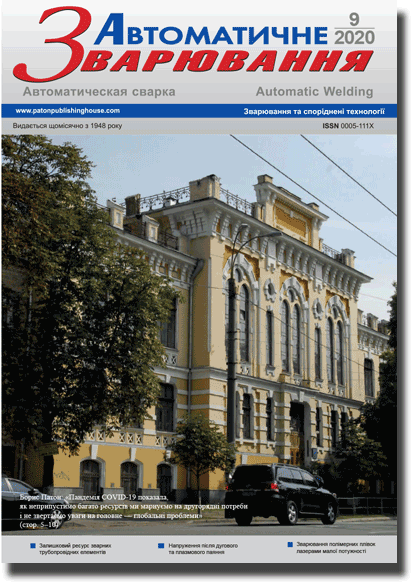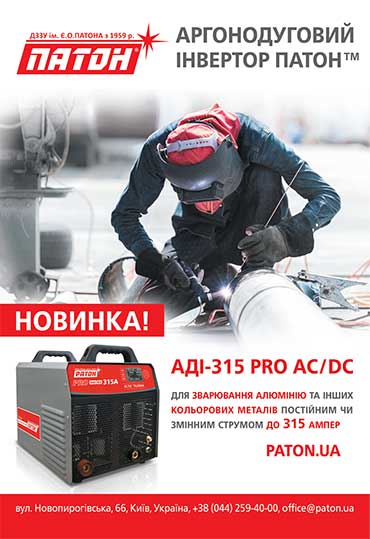| 2020 №09 (02) |
DOI of Article 10.37434/as2020.09.03 |
2020 №09 (04) |

"Avtomatychne Zvaryuvannya" (Automatic Welding), #9, 2020, pp. 28-35
Fatigue life of samples after wear-resistant, fabrication and repair surfacing
I.O. Ryabtsev1, V.V. Knysh1, A.A. Babinets1, S.O. Solovej1, V.M. Demenkov2
1E.O. Paton Electric Welding Institute of the NAS of Ukraine. 11 Kazymyr Malevych Str., 03150, Kyiv, Ukraine. E-mail: office@paton.kiev.ua
2State Company «State Scientifi c and Technical Center for Nuclear and Radiation Safety». 35-37 Vasyl-Stys Str., 03142, Kyiv, Ukraine. E-mail: vm_demenkov@sstc.com.ua
Cyclic fatigue life of specimens surfaced by fl ux-cored wire PP-Np-25Kh5FMS that provides deposited metal of the type of tool semiheat- resistant steel was studied. The design of the surfaced specimens and procedure of their testing simulated the operating conditions of mill rolls, for surfacing which fl ux-cored wire PP-Np-25Kh5FMS is widely used. Cyclic fatigue life of the specimens directly after surfacing was evaluated, as well as the eff ectiveness of application of repair surfacing to increase the residual cyclic fatigue life of specimens, in which preliminary testing revealed fatigue cracks in the deposited wear-resistant layer. The numerical method was used to determine the stress-strain state and calculate the stress intensity factor on the front of a nonthrough-thickness crotch corner fatigue crack that propagated in a specimen of 40Kh steel with a wear-resistant deposited layer at three-point zero-to-load cyclic loading. It is shown that the maximum values of the stress intensity factor along the crack front are located at approximately 1 mm distance from the vertical side face in the deepest point of the crack front and during fracture they reach the value of 52…64 MPa√m. During investigations it was shown that application of repair surfacing to products with fatigue cracks after their long-term service does not result in a signifi cant extension of their cyclic fatigue life after repair. This is related to the fact that after long-term service the defectfree layer of the deposited metal has a considerable level of accumulated fatigue damage. That is why performance of repair of the product region damaged by a fatigue crack, is not eff ective without complete removal of the deposited metal layer. Results obtained in this work will be further used as base ones during performance of comparative assessment of the impact of surfacing technique and technology, as well as surfacing materials, on the fatigue life of specimens. 17 Ref., 3 Tabl., 9 Fig.
Keywords: arc surfacing, manufacturing surfacing, repair surfacing, fatigue, fatigue life, fatigue cracks, stress intensity factor
Received: 24.07.2020
References
1. Gao, F., Zhou, J., Zhou, J. et al. (2017) Microstructure and properties of surfacing layers of dies manufactured by bimetalgradient-layer surfacing technology before and after service. The Int. J. Adv. Manuf. Technol., 88, 1289-1297. https://doi.org/10.1007/s00170-016-8679-02. Zhang, J., Zhou, J., Tao, Y. et al. (2015) The microstructure and properties change of dies manufactured by bimetal-gradient-layer surfacing technology. Ibid., 80, 1807-1814 (2015). https://doi.org/10.1007/s00170-015-7170-7
3. Ahn, D.-G. (2013) Hardfacing technologies for improvement of wear characteristics of hot working tools: A review. Int. J. of Precision Engineering and Manufacturing, 14, 7, 1271-1283. https://doi.org/10.1007/s12541-013-0174-z
4. Jhavar, S., Paul, C.P., Jain, N.K. (2013) Causes of failure and repairing options for dies and molds: A review. Engineering Failure Analysis, 34, 519-535. https://doi.org/10.1016/j.engfailanal.2013.09.006
5. Du, Toit, M., Van, Niekerk J. (2010) Improving the life of continuous casting rolls through submerged arc cladding with nitrogen-alloyed martensitic stainless steel. Welding in the World, 54, 11-12, 342-349. https://doi.org/10.1007/BF03266748
6. Shao, C., Cui, H., Lu, F., Li, Z. (2019) Quantitative relationship between weld defect characteristic and fatigue crack initiation life for high-cycle fatigue property. Int. J. of Fatigue, 123, 238-247. https://doi.org/10.1016/j.ijfatigue.2019.02.028
7. Korotkov, V.A. (2017) More effi cient surfacing. Russian Engineering Research, 37, 701-703. https://doi.org/10.3103/S1068798X17080093
8. Rjabcev, I.A., Senchenkov, I.K., Turyk, Je.V. (2015) Surfacing. Materials, technologies, mathematical modeling. Gliwice, Wydawnictwo politechniki slaskiej [in Russian]. https://doi.org/10.15407/tpwj2015.06.29
9. Liu, H., Yang, S., Xie, C. et al. (2018) Mechanisms of fatigue crack initiation and propagation in 6005A CMT welded joint. J. of Alloys and Compounds, 741, 188-196. https://doi.org/10.1016/j.jallcom.2017.12.374
10. Zerbst, U., Madia, M., Beier, H. T. (2017) Fatigue strength and life determination of weldments based on fracture mechanics. Procedia Structural Integrity, 7, 407-414. https://doi.org/10.1016/j.prostr.2017.11.106
11. Oberg, E. et al. (1996) Machinery`s Handbook (25th ed.), Industrial Press Inc.
12. Zhang, D., Liu, Y., Yin, Y. (2016) Preparation of plasma cladding gradient wear-resistant layer and study on its impact fatigue properties. J. Thermal Spray Technol., 25, 535-545. https://doi.org/10.1007/s11666-015-0370-8
13. Ganesh, P., Moitra, A., Tiwari, P. et al. (2010) Fracture behavior of laser-clad joint of Stellite 21 on AISI 316L stainless steel. Mater. Sci. & Engin., 527, 16-17, 3748-3756. https://doi.org/10.1016/j.msea.2010.03.017
14. Babinets, A.A., Ryabtsev, І.A. (2016) Fatigue life of multilayer hard-faced specimens. Welding Int., 30, 4, 305-309. https://doi.org/10.1080/01431161.2015.1058004
15. Ryabtsev, I.A., Knysh, V.V., Babinets, A.A. et al. (2019) Methods and specimens for comparative investigations of fatigue resistance of parts with multilayer surfacing. The Paton Welding J., 2, 29-34. https://doi.org/10.15407/tpwj2019.02.05
16. Murakami, Yu. (1990) Reference book on stress intensity coeffi cients. In: 2 Vol. Moscow, Mir [in Russian].
17. (2004) Device for control of mechanical stresses and strains in solid media. Pat. UA 71637 С2 [in Ukrainian].
Advertising in this issue:
The cost of subscription/purchase order journals or individual articles
| Journal/Currency | Annual Set | 1 issue printed |
1 issue |
one article |
| TPWJ/USD | 384 $ | 32 $ | 26 $ | 13 $ |
| TPWJ/EUR | 348 € | 29 € | 24 € | 12 € |
| TPWJ/UAH | 7200 UAH | 600 UAH | 600 UAH | 280 UAH |
| AS/UAH | 1800 UAH | 300 UAH | 300 UAH | 150 UAH |
| AS/USD | 192 $ | 32 $ | 26 $ | 13 $ |
| AS/EUR | 180 € | 30 € | 25 € | 12 € |
| SEM/UAH | 1200 UAH | 300 UAH | 300 UAH | 150 UAH |
| SEM/USD | 128 $ | 32 $ | 26 $ | 13 $ |
| SEM/EUR | 120 € | 30 € | 25 € | 12 € |
| TDNK/UAH | 1200 UAH | 300 UAH | 300 UAH | 150 UAH |
| TDNK/USD | 128 $ | 32 $ | 26 $ | 13 $ |
| TDNK/EUR | 120 € | 30 € | 25 € | 15 € |
AS = «Automatic Welding» - 6 issues per year;
TPWJ = «PATON WELDING JOURNAL» - 12 issues per year;
SEM = «Electrometallurgy Today» - 4 issues per year;
TDNK = «Technical Diagnostics and Non-Destructive Testing» - 4 issues per year.








